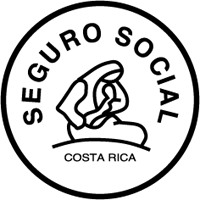Costa Rican Department of Social Security
|
Caja Costarricense de Seguro Social logo | |
| Formation | 1 of November of 1941 |
|---|---|
| Type | Governmental organization |
| Purpose | Health Services |
| Headquarters | San José, Costa Rica |
President | Dra. Rocío Sáenz |
Main organ | Board of Directors (Junta Directiva)[1] |
| Website |
www |
The Costa Rican Department of Social Security or Caja Costarricense de Seguro Social (as it is known in Spanish) is in charge of most of the nation's public health sector. Its role in public health (as the administrator of health institutions) is key in Costa Rica, playing an important part in the state's national health policy making.
Its services are available to all citizens and permanent legal residents. This governmental entity's functions encompass both the administrative and functional aspects. It has the obligation (as a public institution) to formulate and execute health programs that are both preventive (such as: vaccination, informational, fumigation, etc.) and healing (such as: surgery, radiation therapy, pharmacy, clinical, etc.) in nature.[2]
The Costa Rican Department of Social Insurance is also charged with the administration of the public pension system.
Internal Organization
The Costa Rican Department of Social Security has a complex internal organization which administers and oversees all of the entity's actions in every aspect of its functions. It is strategically managed and administered by the Board of Directors, Executive Presidency, and six Managements. Additionally, it has a supervising body that oversees the administrative actions taken.[1]
Executive Presidency
The current Executive President is Dra. María del Rocío Sáenz Madrigal[3] (Rocío Sáenz, for short). The Executive President also chairs the Board of Directors and is appointed by the government.
The Executive President is the highest office any one person can hold within the organization's hierarchy and is charged with the responsibility of executing the Board of Directors' decision. Among other functions, responsibilities, and obligations, the Executive President must coordinate with other government institutions wherever possible or needed.
Apart from having state given obligations (which are exposed in the national law) the Board of Directors can assign other corresponding responsibilities. The Executive President is obliged to provide exclusive services to the Costa Rican Department of Social Insurance; meaning that he or she may not hold any other public office or work independently while serving as Executive President.
Hospitals and clinics
Hospitals and clinics under CCSS administration:
Alajuela
- Hospital San Carlos
- Hospital San Rafael de Alajuela
- Hospital Carlos Luis Valverde Vega (San Ramón)
Cartago
Guanacaste
- Hospital La Anexión
Heredia
- Hospital San Vicente de Paúl (Heredia)
Limón
Puntarenas
- Hospital de Golfito
- Hospital Monseñor Víctor Manuel Sanabria
- Clínica de Miramar
- Hospital de Ciudad Nelly
- Hospital de San Vito
San José
- Hospital Nacional de Niños Carlos Sáenz Herrera, in the city centre
- Hospital San Juan de Dios, in the city centre
- Hospital Mexico, west of San José
- Hospital Rafael Ángel Calderón Guardia, in El Carmen district
- Hospital de la Mujer (Antigua Maternidad Adolfo Carit), in San Sebastián district
- Clínica Doctor Carlos Durán Cartín, in Zapote District.
- Clínica Doctor Ricardo Moreno Cañas
- Clínica Marcial Fallas, in Desamparados canton
- Clínica Doctor Solón Núñez
- Hospital Dr. Fernando Escalante Pradilla, in Pérez Zeledón
References
- 1 2 Information in Spanish from official webpage
- ↑ Functions, Spanish.
- ↑ http://www.ccss.sa.cr/noticias/index/32-ccss/1441-la-dra-maria-del-rocio-saenz-asumira-la-presidencia-ejecutiva-de-la-ccss. Missing or empty
|title=(help)
